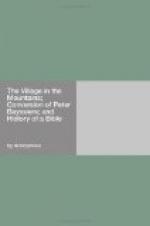The conversation then turned on the value of the sacred volume, and the sinfulness of those who withhold it from perishing and dejected sinners. After some time, the hostess inquired, “Pray, sir, can you tell us if any thing extraordinary is passing in the world? We are shut out from all intercourse; but we have an impression that God is commencing a great work in the earth, and that wonderful events are coming to pass.”
“Great events have taken place, and news is arriving every day,” said M. ——, “from all parts of the world, of the progress of the Gospel, and the fulfilment of the Holy Scriptures. He then gave to his attentive and enraptured auditory an outline of the moral changes accomplished by the diffusion of the Bible, the labours of missionaries and the establishment of schools; but only such an outline as was suited to their general ignorance of the state of what is called the religious world. And when he had concluded, they all joined in the prayer: Thy kingdom come, thy will be done on earth, as it is done in heaven.”
Anxious as was M. —— to pursue his journey, he devoted three hours to this interview. He exhorted them to receive and practise only what they found in the Scriptures, and to cleave to the Lord with full purpose of heart.
The termination of this extraordinary meeting was most affecting: tears of pleasure, gratitude, and regret streamed from the eyes of the mountaineers; and the traveller, though more deeply moved by having seen the grace of God than by all the scenes through which he had passed, went on his way rejoicing, and following the directions of the good widow, he arrived at the town of S——. In this town he had correspondents among the principal inhabitants and authorities, and under the impression of all he had witnessed, he inquired, as if with the curiosity of a traveller, the name of the hamlet he had passed on the mountains, and the nature of the employments, and the character of its inhabitants.
“The men,” said the mayor, “work in the mines, drive the teams, and labour in the fields; and the women and children weave. They are a very curious people, ou res illumines, (new lights,) but the most honest work-people in the country—probity itself. We have no occasion to weigh our silk, either when we give it out or take it in, for we are sure not to lose the value of a farthing; and the kindest creatures in the world: they will take their clothes off their backs to give to any one in distress: indeed, there is no wretchedness among them, for, though poor, they are industrious, temperate, charitable, and always assist each other; but touch them on their religion, and they are almost idiots. They never go to mass nor confession—in fact, they are not christians, though the most worthy people in the world; and so droll: imagine those poor people, after working all the week, instead of enjoying the Sunday, and going to a fete or a ball to amuse themselves, meeting in each other’s houses, and sometimes in the mountains, to read some book, and pray, and sing hymns. They are very clever work-people, but they pass their Sundays and holidays stupidly enough.”




